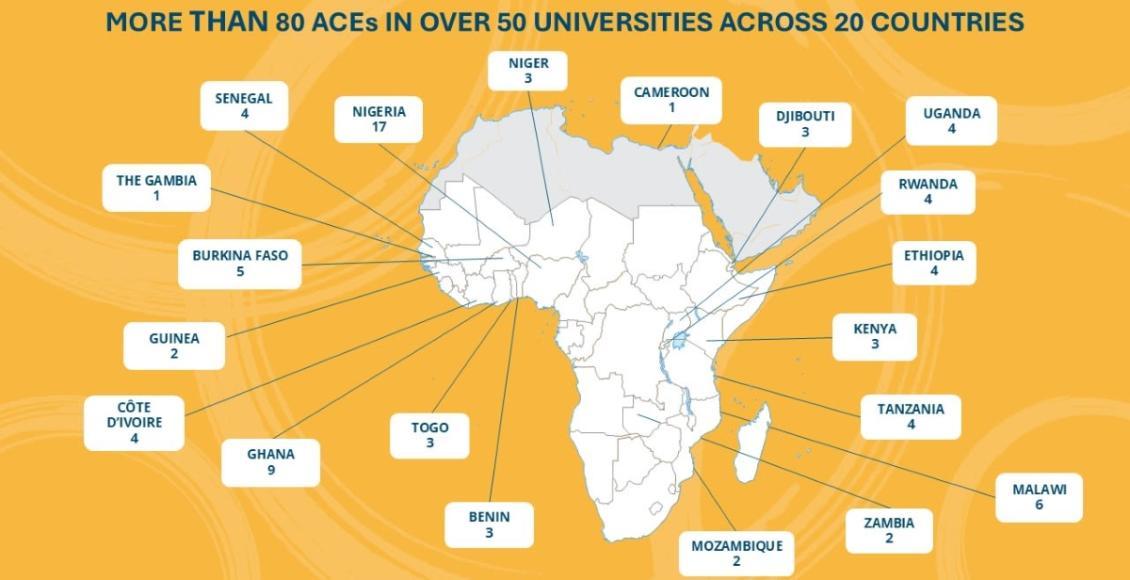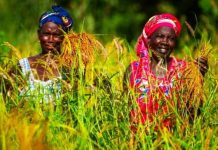Africa-Press – Eritrea. The youth population in Africa is surging, with nearly half a billion people set to reach working age by 2035.
Jobs will be the foundation of opportunity for this generation, providing a path to dignity, empowerment, and shared prosperity.
The challenge is urgent: turning this demographic wave into an engine of growth requires decisive action to create enough good jobs. Without it, millions risk being left behind, with consequences reaching far beyond Africa’s borders.
The International Development Association (IDA), the World Bank’s fund for low-income countries, is helping countries rise to this challenge. By building skills, unlocking private investment, and supporting sectors from agriculture to digital services, IDA is helping translate growth into livelihoods.
Across Africa, the impact is visible: farmers accessing new markets, young graduates entering emerging industries, women entrepreneurs expanding their businesses, and communities building resilience through work.
In the Democratic Republic of Congo, opportunity often starts small.
Venus, a young mother and trained seamstress from Gemena, used her IDA-supported social protection grant to buy two used sewing machines. Today, she runs her own tailoring business with eight machines, trains over 30 apprentices annually, and pays school fees for her children.
Like Venus, others throughout the DRC are turning small grants into lasting livelihoods. Valentine trained as a baker, opening a modest pastry shop that quickly became the pride of her neighborhood. Gilbert, once unemployed, learned carpentry and now builds furniture for families across town.
These aren’t isolated stories.
Across the country, IDA’s social protection programs are helping thousands of vulnerable people turn short-term relief into long-term livelihoods. What began as a safety net has become a springboard: apprenticeships, microenterprises, and small workshops multiplying into local economies that can withstand shocks.
That same principle—transforming risk into resilience—shapes IDA’s approach in Ethiopia, where rapid urbanization is reshaping the country’s future. Every year, more than two million Ethiopians move into cities, bringing both urgency and opportunity.
“With World Bank support, we implemented a comprehensive financial management system and revenue enhancement plan, resulting in a 262 percent increase in municipal revenue over five years. This growth supported infrastructure investment and job creation, strengthening our city’s resilience and economic sustainability.”
To keep pace, the Urban Institutional and Infrastructure Development Program is helping municipalities build roads, drainage, and public spaces—while strengthening the local institutions that manage them. The results are transformative. Over 1.15 million jobs have been created under the progam so far, nearly half of them for women.
Jobs in construction, services, and small businesses ripple outward, ensuring that urban growth translates into shared prosperity.
These local transformations add up. By linking social protection and infrastructure projects with livelihood creation, IDA is helping countries move toward sustainable, inclusive growth—where even the most vulnerable can contribute to, and benefit from, economic progress.
Powering Jobs: Mission 300
Reliable, affordable, and sustainable energy is essential for economies, services, and jobs. Yet nearly 600 million people in Sub-Saharan Africa still lack electricity, limiting jobs and growth.
Mission 300, led by the World Bank Group (WBG) and African Development Bank (AfDB), aims to connect 300 million people to electricity by 2030.
By expanding access, improving utility efficiency, attracting private investment, and strengthening regional integration, the initiative will power homes, businesses, and communities, creating jobs across energy, manufacturing, and services.
IDA financing is key to scaling access and ensuring Africa’s energy sector drives economic growth and employment.
In the past three years, IDA has helped over 55 million people gain electricity access. The WBG will leverage $30 billion in IDA resources through 2030, using innovative tools to mobilize private sector investment and expand energy opportunities.
IDA: Shaping Skills for Tomorrow’s Jobs
Today’s workforce must be prepared for the jobs of tomorrow. That’s why IDA is helping African countries close the skills gap by equipping young people with the knowledge and training to thrive in fast-changing economies.
One of the most ambitious efforts is the African Centers of Excellence (ACEs), a revolution underway in universities across the continent.
In Nigeria, Senegal, and Rwanda, artificial intelligence and the Internet of Things are now central to university curricula, training a new generation to drive innovation and power the new economy.
In Ghana, researchers at West Africa Center for Crop Improvement (WACCI) are accelerating agricultural innovations to boost food security. In Senegal, ACE’s mobile clinics are extending healthcare to remote villages, training the next generation of medical innovators.
And in Ethiopia, the Center for Innovative Drug Development and Therapeutic Trials for Africa (CDT-Africa) have established the incubation facility Africa Bio-Hub, supporting development of novel antimicrobial drugs, vaccines, and diagnostic tools for societal use.
“My greatest satisfaction is that we managed to create a skills-based degree—not just a theoretical one. And the results speak for themselves.”
Together, the centers have already trained more than 90,000 students, including 7,650 PhDs, and over 52,000 professionals’ reskilling for the region’s priority sectors, while generating USD183 million in external funding.
Just as importantly, they are creating opportunities that keep young professionals invested in and serving their communities, contributing to the socioeconomic transformation on the African continent.
In Rwanda, the Skills for Growth project is following the same logic at the community level.
Joy, once a street vendor in Kigali, dreamed of working in media, but lacked training. With support from the program, she enrolled in digital skills courses, graduated with a qualification, and now works as a communications officer at a local firm.
“ISEP goes to great lengths to train its students well. Earning a degree there allows you to move forward, to have more confidence, and to give of yourself.”
Vocational education is becoming a powerful engine for job creation and youth empowerment in Senegal.
Established in Thiès in 2013 with support from IDA, the public Tertiary Education Vocational Institute (ISEP) marked a new chapter for higher learning, linking classroom theory with the practical skills that employers demand.
Since its inception, nearly 90 percent of graduates have found employment, demonstrating how market-relevant training opens real doors.
Building on this success, the IDA-financed Espoir-Jeunes (“Hope for Youth”) project is scaling the ISEP model nationwide through eight new institutes in regions such as Kaffrine, Kolda, and Tambacounda.
As of 2025, nearly 15,000 students—more than half of them women—are gaining hands-on experience that helps them transition directly into the workforce.
Across these efforts, the message is clear: when young people are given the tools to learn and innovate, they create opportunities not just for themselves, but for entire economies.
IDA: Expanding Opportunities for Women and Youth
Training the next generation is only part of the story. Breaking down barriers so women and youth can turn knowledge into lasting livelihoods is just as critical.
In Tanzania, engineer Diana Mbogo is showing what happens when barriers are lifted. With support from IDA through the Tanzania Rural Electrification Expansion Project (TREEP), her company introduced solar-powered fishing lamps and greenhouse dryers along Lake Victoria, cutting drying times in half, reducing losses, and boosting incomes.
More than 3,000 people, most of them women, are already benefiting. Diana has created 30 jobs directly and aims to reach 25,000 more.
“I wanted to disrupt the status quo and bring innovation to an industry that needed it most,” she said. “Seeing the positive impact, especially on the women in this community, has been incredibly rewarding.”
In Mauritania, IDA is supporting two complementary programs that expand opportunity from the most vulnerable households to the next generation of workers.
The Tekavoul National Social Transfer Program provides cash transfers that support health, nutrition, and children’s education, while the Youth Employability Project (YEP) has trained more than 12,000 young people—70 percent of them women—and nearly 1,000 in technical and management skills.
By combining social protection with skills training, Mauritania is turning short-term relief into lasting opportunities for work and self-reliance.
“We have a vision of becoming a major industry, but for that we need a proper laboratory and adequate equipment. To stay in the game, acquiring a modern equipment, recruiting more staff and ensuring proper product certification will be key.”
In Cameroon, an IDA-financed Economic Inclusion Project is helping to unlock opportunities for thousands of young people in the country’s main cities.
Its Business Plan Competition provides grants and coaching for entrepreneurs like chemical engineer Francoise Becken Epeti, who employs 12 staff in her eco-friendly agribusiness. For beginners, the Economic Inclusion of Youth program offers training, mentoring, and seed grants. More than 65,000 young people will benefit.
IDA: Leveraging Private Sector Investment for Growth
Through the Private Sector Window (PSW), IDA partners with the International Finance Corporation (IFC) and the Multilateral Investment Guarantee Agency (MIGA) to de-risk investments and open opportunities where markets often fail.
By absorbing some of the early risks, the PSW gives companies the confidence to invest, expand, and create jobs in high-risk, fragile, and conflict-affected settings.
In Madagascar, entrepreneurs once excluded from the financial system are finding new ways to grow. Through IFC’s Base of the Pyramid Platform, supported by the IDA PSW, small business owners can now access microloans to expand their businesses, employ others, and provide for their families.
By 2027, the program aims to reach 140,000 micro, small, and medium-sized enterprises (MSMEs), sparking opportunities across communities long left out of the formal economy.
“My wife and I have been able to make concrete progress. We built our home. We could send our children to school.”
Jacques Fidelis Randimbiarisoa, a wood craftsman from Antananarivo, used his first small loan to buy materials for handcrafted clocks. With steady financing and financial literacy training, Jacques built a thriving workshop that now employs five people and sells across Madagascar and overseas.
Agribusiness, too, can be a powerful engine of employment.
In Mozambique, IFC invested in Westfalia Fruto with PSW support to expand avocado and litchi production in Barue District. In just five years, over 600 jobs were created—most filled by local workers—and the number of commercial fruit and vegetable farmers in the area doubled. Families who once struggled to survive are now running small businesses, sending children to school, and investing in their communities.
IDA: Unlocking Africa’s Promise
Through investments in skills, energy, and inclusive markets, IDA is transforming opportunity into lasting livelihoods across Africa.
Following the conclusion of its 21st replenishment in December 2024, IDA is channeling renewed global support to expand these efforts, helping countries create jobs, strengthen resilience, and accelerate inclusive growth.
Infrastructure upgrades, stronger health systems, and initiatives like Mission 300 are powering economies and creating jobs.
At the same time, the African Centers of Excellence, training programs, and social protection initiatives are equipping young people and women to innovate, lead, and build resilience.
With these efforts, IDA is helping the continent chart a path toward shared prosperity.
tanzaniatimes
For More News And Analysis About Eritrea Follow Africa-Press







